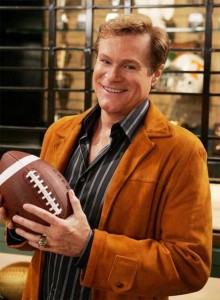 There are some actors who, when you first see them, they stick with you. The first time I saw David Keith on screen was when he played the young Army PFC that spends some time with Bette Midler in “The Rose.” Next for me was his role as Robert Redford’s fellow prisoner (and eventual right hand man) in “Brubaker.” But it was his role as Naval Pilot Candidate Sid Worley in “An Officer and a Gentleman” that made not only earned him two Golden Globe nominations but stardom.
There are some actors who, when you first see them, they stick with you. The first time I saw David Keith on screen was when he played the young Army PFC that spends some time with Bette Midler in “The Rose.” Next for me was his role as Robert Redford’s fellow prisoner (and eventual right hand man) in “Brubaker.” But it was his role as Naval Pilot Candidate Sid Worley in “An Officer and a Gentleman” that made not only earned him two Golden Globe nominations but stardom.
Since then he has had high profile roles in both film (“Firestarter,” “Heartbreak Hotel,” “Major League II”) and television (“Flesh and Blood,” “High Incident,” “The Class”). I had the great opportunity to meet Mr. Keith in 1993 on the set of “Major League II” in Baltimore and a nicer, more down to earth person I’ve never met. Especially at 11:00 at night on a cold October evening at Camden Yards.
This week, Mr. Keith’s film, “Awaken, co-starring Daryl Hannah and Jason London, arrives on DVD. Mr. Keith recently spoke with me, with that soft Tennessee twang, about his latest role, his work preferences and feeling much better, thank you.
Mike Smith: Give us a brief introduction to “Walsh,” your character in “Awaken”
David Keith: He is a black market organ harvesting surgeon on an island where some bad people are kidnapping people, making them live in the jungle so they can clean out their systems and then harvest their organs for wealthy people who have loved ones who need an organ transplant but don’t want to wait in line for them.
MS: What, if anything, attracted you to the project?
DK: The producer and co-writer (Natalie Burns) is a friend of mine. She asked if I would come do a role for her. I said “yes” before I read the script.
MS: You seem to work equally between film and television. Do you have a preference?
DK: If I could be stuck in one job for the next ten years it would be in a situation-comedy. That is the best medium because it combines the best of theater and the best of film. When you do a play on Broadway you have to sign a two-year contract, but you get sick of it after about three months when you’re doing eight shows a week. When you do a movie, you never shoot anything in order. There’s no audience. There’s no real feeling of the project as one piece like there is in theater. In a sit-com it’s like doing a different play every week. You’re the same character but you’ve got new lines – new scenes – new things to do each week. And the hours are tremendous work – about four to six hours a day – five days a week,  instead of fifteen hours a day, six days a week on a film. So sit-coms are my favorite medium. And “The Class” is my favorite sit-com that I’ve ever been on.
instead of fifteen hours a day, six days a week on a film. So sit-coms are my favorite medium. And “The Class” is my favorite sit-com that I’ve ever been on.
MS: You’ve directed in the past. Any intention of getting back behind the camera again?
DK: Yes, but only under my terms. Those were not great directing experiences – I didn’t have the control I needed. I did the best I could with what I had to work with. I have a script I hope to make. I had the money all in place years ago but then the guy who had signed the contract reneged on the contract. That script is still sitting in my drawer waiting for someone to come along and say, “let’s make this movie.” (laughs)
MS: What do you have coming up next?
DK: I don’t actually know what my next job is going to be. I had some medical issues – nothing serious, nothing to worry about – that kept me out of work for the last year. I haven’t worked in a year for the first time in my career.
MS: Everything is good now?
DK: Everything is good, yes. I’m healthy and ready to go. Now it’s up to my agents. I don’t live in L.A., I live in Tennessee. I don’t go to auditions. Somebody has to remember me and want me. (laughs)

